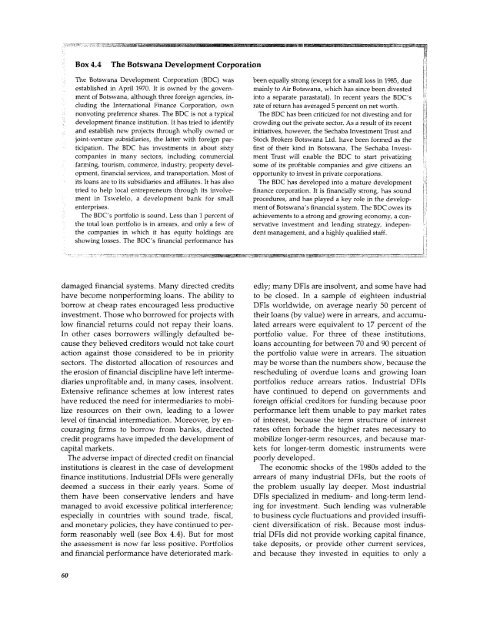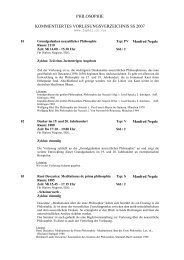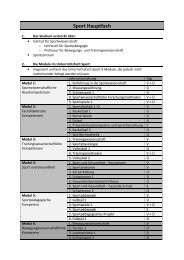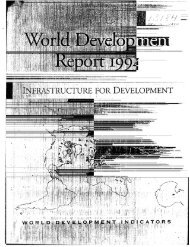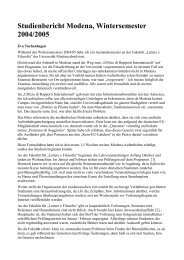Financial systems and development
Financial systems and development
Financial systems and development
Create successful ePaper yourself
Turn your PDF publications into a flip-book with our unique Google optimized e-Paper software.
Box 4.4<br />
The Botswana Development Corporation<br />
The Botswana Development Corporation (BDC) was been equally strong (except for a small loss in 1985, due<br />
established in April 1970. It is owned by the govern- mainly to Air Botswana, which has since been divested<br />
ment of Botswana, although three foreign agencies, in- into a separate parastatal). In recent years the BDC's<br />
cluding the International Finance Corporation, own rate of return has averaged 5 percent on net worth.<br />
nonvoting preference shares. The BDC is not a typical The BDC has been criticized for not divesting <strong>and</strong> for<br />
<strong>development</strong> finance institution. It has tried to identify crowding out the private sector. As a result of its recent<br />
<strong>and</strong> establish new projects through wholly owned or initiatives, however, the Sechaba Investment Trust <strong>and</strong> fl<br />
joint-venture subsidiaries, the latter with foreign par- Stock Brokers Botswana Ltd. have been formed as the<br />
ticipation. The BDC has investments in about sixty first of their kind in Botswana. The Sechaba Investcompanies<br />
in many sectors, including commercial ment Trust will enable the BDC to start privatizing<br />
farming, tourism, commerce, industry, property devel- some of its profitable companies <strong>and</strong> give citizens an<br />
opment, financial services, <strong>and</strong> transportation. Most of opportunity to invest in private corporations.<br />
its loans are to its subsidiaries <strong>and</strong> affiliates. It has also The BDC has developed into a mature <strong>development</strong><br />
tried to help local entrepreneurs through its involve- finance corporation. It is financially strong, has sound<br />
Tment in Tswelelo, a <strong>development</strong> bank for small procedures, <strong>and</strong> has played a key role in the developenterprises.<br />
ment of Botswana's financial system. The BDC owes its<br />
The BDC's portfolio is sound. Less than 1 percent of achievements to a strong <strong>and</strong> growing economy, a conthe<br />
total loan portfolio is in arrears, <strong>and</strong> only a few of servative investment <strong>and</strong> lending strategy, indepenthe<br />
companies in which it has equity holdings are dent management, <strong>and</strong> a highly qualified staff.<br />
showing losses. The BDC's financial performance has<br />
damaged financial <strong>systems</strong>. Many directed credits edly; many DFIs are insolvent, <strong>and</strong> some have had<br />
have become nonperforming loans. The ability to to be closed. In a sample of eighteen industrial<br />
borrow at cheap rates encouraged less productive DFIs worldwide, on average nearly 50 percent of<br />
investment. Those who borrowed for projects with their loans (by value) were in arrears, <strong>and</strong> accumulow<br />
financial returns could not repay their loans. lated arrears were equivalent to 17 percent of the<br />
In other cases borrowers willingly defaulted be- portfolio value. For three of these institutions,<br />
cause they believed creditors would not take court loans accounting for between 70 <strong>and</strong> 90 percent of<br />
action against those considered to be in priority the portfolio value were in arrears. The situation<br />
sectors. The distorted allocation of resources <strong>and</strong> may be worse than the numbers show, because the<br />
the erosion of financial discipline have left interme- rescheduling of overdue loans <strong>and</strong> growing loan<br />
diaries unprofitable <strong>and</strong>, in many cases, insolvent. portfolios reduce arrears ratios. Industrial DFIs<br />
Extensive refinance schemes at low interest rates have continued to depend on governments <strong>and</strong><br />
have reduced the need for intermediaries to mobi- foreign official creditors for funding because poor<br />
lize resources on their own, leading to a lower performance left them unable to pay market rates<br />
level of financial intermediation. Moreover, by en- of interest, because the term structure of interest<br />
couraging firms to borrow from banks, directed rates often forbade the higher rates necessary to<br />
credit programs have impeded the <strong>development</strong> of mobilize longer-term resources, <strong>and</strong> because marcapital<br />
markets. kets for longer-term domestic instruments were<br />
The adverse impact of directed credit on financial poorly developed.<br />
institutions is clearest in the case of <strong>development</strong> The economic shocks of the 1980s added to the<br />
finance institutions. Industrial DFIs were generally arrears of many industrial DFIs, but the roots of<br />
deemed a success in their early years. Some of the problem usually lay deeper. Most industrial<br />
them have been conservative lenders <strong>and</strong> have DFIs specialized in medium- <strong>and</strong> long-term lendmanaged<br />
to avoid excessive political interference; ing for investment. Such lending was vulnerable<br />
especially in countries with sound trade, fiscal, to business cycle fluctuations <strong>and</strong> provided insuffi<strong>and</strong><br />
monetary policies, they have continued to per- cient diversification of risk. Because most indusform<br />
reasonably well (see Box 4.4). But for most trial DFIs did not provide working capital finance,<br />
the assessment is now far less positive. Portfolios take deposits, or provide other current services,<br />
<strong>and</strong> financial performance have deteriorated mark- <strong>and</strong> because they invested in equities to only a<br />
60


